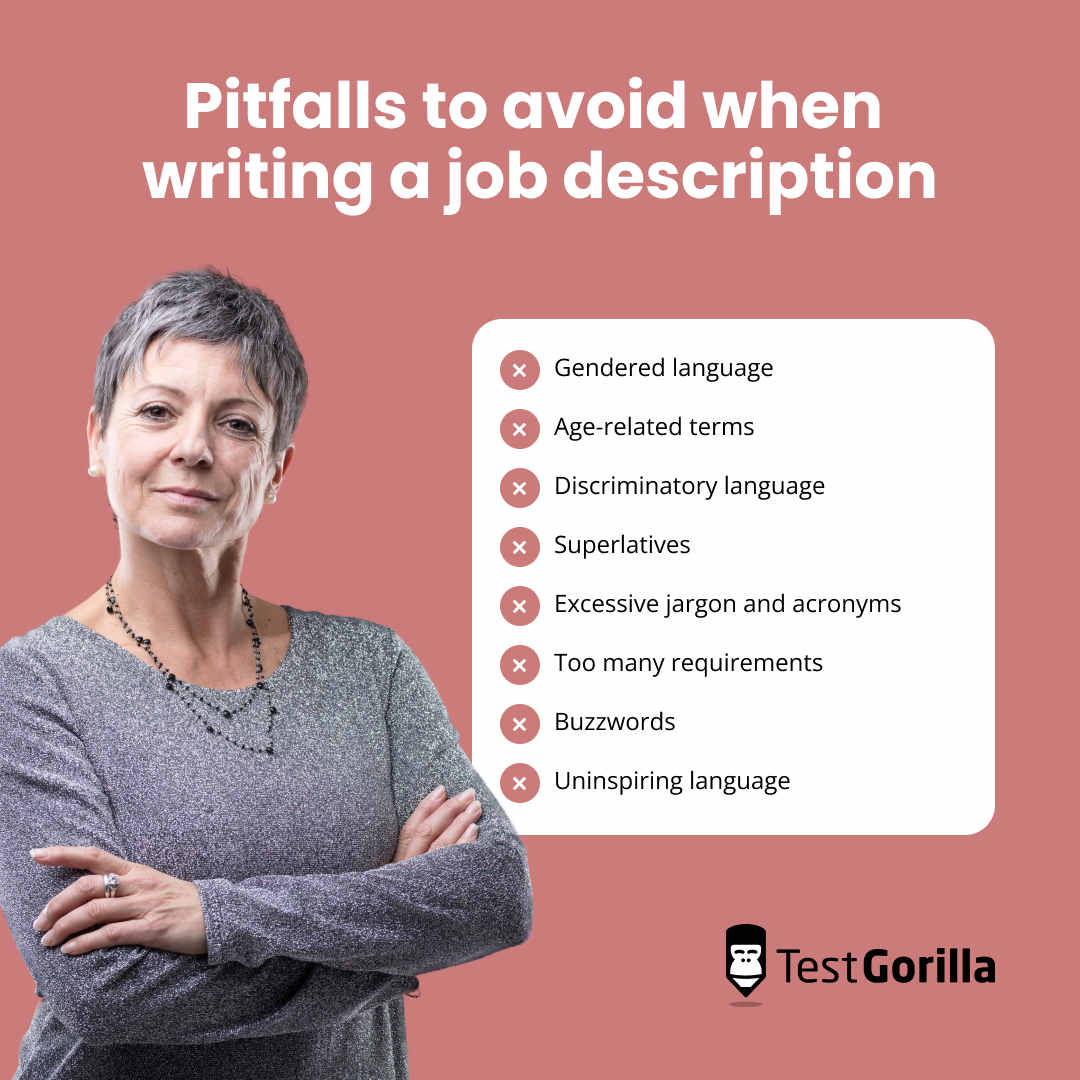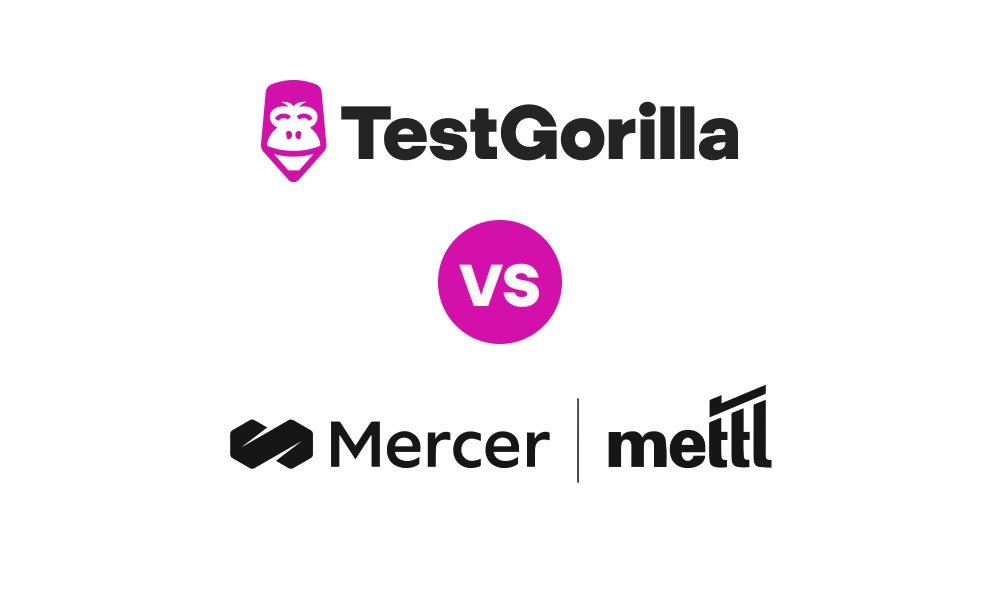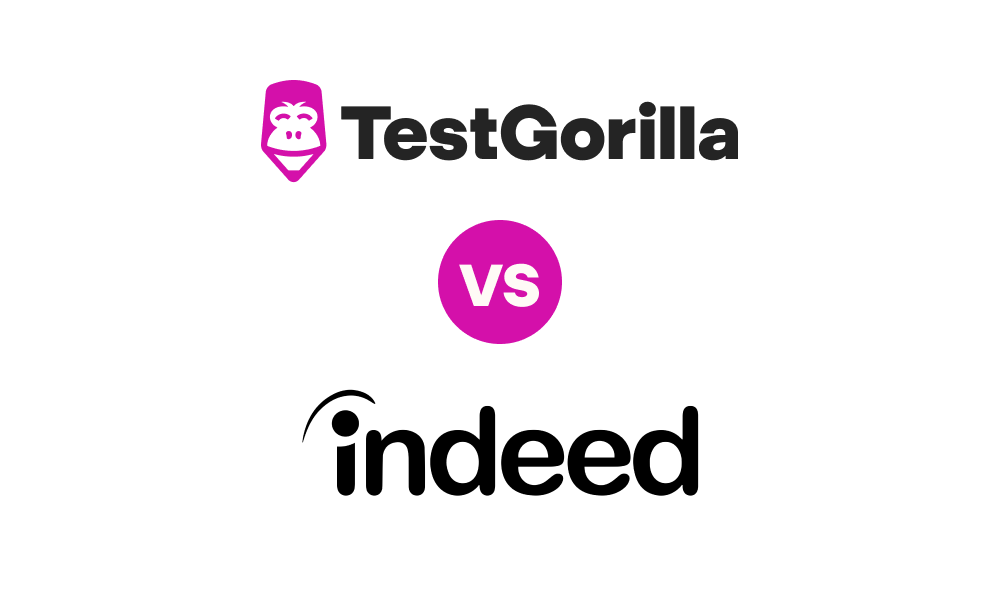Crafting compelling job descriptions is a cornerstone of successful recruitment, but it's not as straightforward as it might seem. Language plays a pivotal role in setting the stage for the hiring process.
Job descriptions riddled with discriminatory language, vague buzzwords, and confusing jargon could mean your best-fit candidate abandoning the application for your open role. It's a missed connection and a lost chance for a successful partnership.
In this article, we'll explore eight pitfalls to avoid, provide practical alternatives, and equip you with the knowledge to craft job descriptions that resonate with top talent.
Table of contents
8 pitfalls to avoid when writing a job description
Effective language is vital in your job description. Let's jump right in and explore eight common pitfalls to avoid as you start the writing process.
1. Gendered language
Prioritize gender-neutral language. This powerful strategy broadens the appeal of job roles to a wider applicant pool, helping to attract top-tier talent. It reflects a commitment to diversity and inclusion, sending a clear message that your organization is focused on skills and qualifications rather than outdated stereotypes.
For instance, when using "server" instead of "waitress," you signal that you’re interested in individuals who excel at providing excellent customer service, regardless of their gender.
Gender-neutral language ensures your job listings are more welcoming and appealing to individuals of all genders, creating a culture of inclusivity where everyone feels valued and acknowledged for their distinct skills and contributions.
Here are some role titles to be aware of:
Chairman (use “chairperson” or “chair”)
Stewardess or steward (use “flight attendant”)
Foreman (use “supervisor” or “team leader”)
Maid (use “housekeeper” or “cleaning staff”)
Craftsman (use “craftsperson” or “artisan”)
Repairman (use “repair technician” or “maintenance worker”)
Delivery man (use “delivery driver” or “courier”)
2. Age-related terms
It's important to make job listings attractive to all applicants, so refrain from using age-related terms, like "young" or "senior."
Instead, focus on qualifications and experience. This practice aligns with a commitment to diversity and equal opportunities, signaling a preference for skills and expertise over age. This helps to promote an environment of equal opportunity at your organization.
For example, instead of requesting a "young and dynamic candidate," emphasize the importance of relevant skills, like attention to detail or the ability to multitask.
Be sure to remove these age-related terms:
Young
Senior (when used to imply age rather than a level of experience or job title)
Fresh (or new blood)
Old school
Energetic (if implying youth)
Seasoned (if implying older age)
Digital native
Years of experience (if specifying a narrow range)
Overqualified (often used as a euphemism for “older”)
Millennial or Gen Z (as requirements)
3. Discriminatory language
It’s essential for hiring managers and recruiters to enhance your organization's reputation for fairness and equality by consciously avoiding language that discriminates based on race, religion, disability, or other protected characteristics.
Prioritize qualifications and abilities as the primary criteria. This not only ensures compliance with anti-discrimination laws but expands your talent pool, bringing in a more diverse range of candidates to boost creativity and innovation.
Words and phrases to avoid:
Specific religious references
"Able-bodied" or any term suggesting a preference for certain physical abilities
Racial or ethnic terms (for example, specifying a particular race or ethnicity)
"Native English speaker" or similar language preferences that could exclude non-native speakers
"Traditional" or "non-traditional" family status or lifestyle preferences
References to specific nationalities or citizenship, unless legally required for the role
"Clean-shaven" or any other appearance-based requirements not essential to the job
4. Superlatives
Avoid overusing superlatives like "the best," "world-class," or "unmatched." Instead, aim for a balanced and accurate portrayal of the role and the company. Excessive superlatives can create unrealistic expectations and potentially deter qualified candidates who may perceive the job description as exaggerated or insincere.
Realistic job descriptions attract candidates who genuinely align with the position's responsibilities and the company's culture, increasing the likelihood of long-term engagement and success. Additionally, it enhances a sense of transparency and trust, establishing a positive foundation for the employer-candidate relationship.
Here are some specific superlatives to avoid:
The best
World-class
Unmatched
Unparalleled
Elite
Superior
Outstanding
Exceptional
Cutting-edge
Leading
Innovative (when overused or not genuinely applicable)
One-of-a-kind
Premier
Unrivaled
5. Excessive jargon and acronyms
Minimize the use of industry-specific jargon and acronyms in your job descriptions. Aim for clear and accessible language that can be easily understood by candidates from diverse backgrounds and industries.
Excessive jargon can create confusion and exclude potential candidates who may not be familiar with specialized terminology.
By using language that is easily comprehensible to a broader audience, you increase the accessibility of your job listings. It ensures that candidates from various backgrounds can confidently assess whether they possess the relevant qualifications and skills for the role.
Jargon and obscure acronyms to watch out for:
Acronyms without explanation (for example, SEO, KPI, CRM – when used for broader roles)
Complex industry-specific language not commonly understood outside the field
Slang or informal language that might not be universally understood
Abbreviations that are not widely recognized outside your company or industry
"Insider" terms that assume industry experience
Phrases that could be confusing without context
6. Too many requirements
Concentrate on the essential qualifications necessary for your open role. Listing an abundance of requirements can make the position seem inaccessible and discourage potential talent, limiting your applicant pool.
Reducing your qualification requirements to ‘must-haves’ increases your reach to those who may have valuable transferable skills but lack extensive experience in your specific industry.
7. Buzzwords
Use straightforward language that precisely describes the role and its responsibilities. Overused buzzwords like "synergy," "innovative," or "rock star” can dilute the clarity and authenticity of your job listings.
By using clear language, you create a more honest and compelling portrayal of the job, which resonates with candidates who value transparency and precision.
This approach ensures that potential candidates understand the nature of the role, reducing the likelihood of mismatched expectations. It also enables candidates to gauge their alignment with the position more accurately, resulting in a better fit for both the candidate and the company.
Here’s a list of buzzwords to avoid in your job descriptions:
Synergy
Innovative (when overused)
Rock star
Ninja
Guru
Dynamic
Game-changer
Thought leader
Cutting-edge
Best-in-class
Out-of-the-box thinker
Go-getter
Visionary
8. Uninspiring language
Use language that not only informs but also excites potential candidates. Steer clear of dull, generic, or uninspiring phrases that might leave job seekers feeling unenthused. Writing in a positive and engaging tone can make your job listings more appealing.
Paint a vivid picture of what it's like to work at your company, capturing the essence of the role and the exciting opportunities it offers. This results in a more motivated and qualified pool of candidates who are genuinely enthusiastic about your organization.
Here's a list of uninspiring language and phrases to be careful of:
Duties include
Job will involve
Work on
Manage tasks
Participate in
Required to
Must be able to
Seeking a candidate to fill a role
Standard benefits
Competitive salary (without specifics)
Typical workday
Promote inclusivity with TestGorilla
Now that you know the language to avoid in job descriptions, the next step is to embed inclusivity in your recruitment practices.
TestGorilla champions an inclusive hiring process, focusing on skills-based, objective, and data-driven assessments. Our vast library of 400-plus tests effectively mitigates bias by evaluating candidates based on their role-specific skills, cognitive abilities, and personality attributes.
For the most accurate results, use a combination of hard and soft skills tests tailored to your role’s unique needs.
Get started with TestGorilla today. Sign up for a free 30-minute live demo or register for a free account.
Related posts
Hire the best candidates with TestGorilla
Create pre-employment assessments in minutes to screen candidates, save time, and hire the best talent.
Latest posts
The best advice in pre-employment testing, in your inbox.
No spam. Unsubscribe at any time.

Hire the best. No bias. No stress.
Our screening tests identify the best candidates and make your hiring decisions faster, easier, and bias-free.
Free resources
This checklist covers key features you should look for when choosing a skills testing platform
This resource will help you develop an onboarding checklist for new hires.
How to assess your candidates' attention to detail.
Learn how to get human resources certified through HRCI or SHRM.
Learn how you can improve the level of talent at your company.
Learn how CapitalT reduced hiring bias with online skills assessments.
Learn how to make the resume process more efficient and more effective.
Improve your hiring strategy with these 7 critical recruitment metrics.
Learn how Sukhi decreased time spent reviewing resumes by 83%!
Hire more efficiently with these hacks that 99% of recruiters aren't using.
Make a business case for diversity and inclusion initiatives with this data.



















